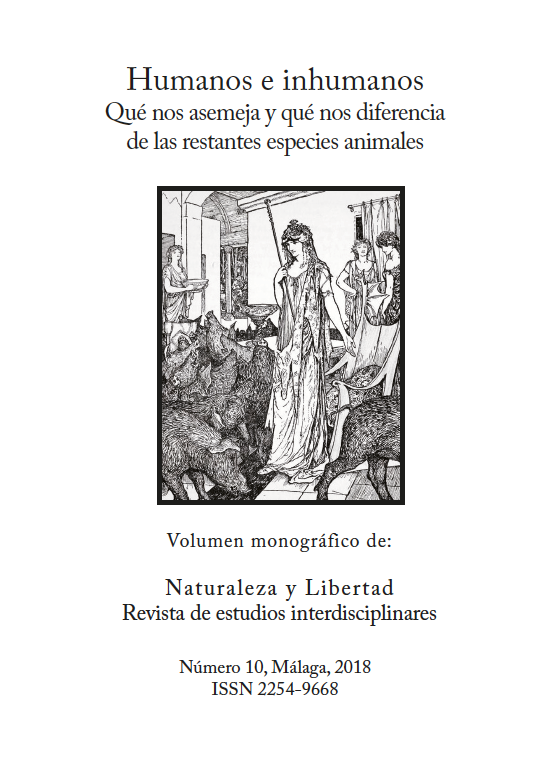La relación hombre-animal en la mitología griega
DOI:
https://doi.org/10.24310/nyl.v10i3.3666Keywords:
híbrido, sagrado, dioses, metamorfosis, otredad y poesíaAbstract
Resumen: El autor analiza la relación hombre-animal en el imaginario griego desde un ángulo concreto, como símbolo de la intervención de lo divino sobre lo humano y como vehículo de expresión de la identidad del hombre en la naturale-za. Los encuentros con los seres híbridos y las metamorfosis en otras especies son un lenguaje profundo de representación, una dimensión de lo sagrado, de aquello que provoca fascinación y terror, que acerca al hombre a situaciones de transi-ción, a un juego de espejos donde el animal es lo otro y donde se desvelan los anhelos del hombre por escapar al encierro de los límites de su condición.
Palabras clave: híbrido, sagrado, dioses, metamorfosis, otredad y poesía.
The man-animal relationship in the Greek Mythology
Abstract: The author analyses the man-animal relationship in the Greek imagi-nary from a concrete point of view, as a symbol of the intervention of the divine over the human and as a vehicle for the expression of the identity of man in na-ture. Meetings with hybrid beings and others metamorphose into another species are a deep language of representation, a dimension of what is sacred, of that which causes fascination and terror, which makes man become closer to situations of transition, to a mirror game where the animal is the Other and where man’s desires of escaping confinement of the limits of their condition is revealed.
Keywords: hybrid, sacred, gods, metamorphosis, otherness, poetry.
Recibido: 25/9/2017 Aprobado: 5/11/2017
Downloads
Metrics
Downloads
Published
How to Cite
Issue
Section
License
Those authors who have publications with this journal, accept the following terms:
1. Copyright and licensing information are clearly described on the journal’s web site: all content published in Naturaleza y Libertad is open acces without limit, and are subject to the Attribution-NonCommercial-ShareAlike 4.0 International (CC BY-NC-SA 4.0) license. The full text of which can be consulted at https://creativecommons.org/licenses/by-nc-sa/4.0/
2. It is the responsibility of the authors to obtain the necessary permissions for the images that are subject to copyright. The authors whose contributions are accepted for publication in this journal will retain the non-exclusive right to use their contributions for academic, research and educational purposes, including self-archiving or deposit in open access repositories of any kind. The electronic edition of this magazine is edited by the Editorial de la University of Malaga (UmaEditorial), being necessary to cite the origin in any partial or total reproduction.
3. This journal allows and encourages authors to publish papers on their personal websites or in institutional repositories, both before and after their publication in this journal, as long as they provide bibliographic information that accredits, if applicable, your posting on it.
4. In no case will anonymous papers be published.





18.png)













